Ministry of Environment, Forest and Climate Change
National Conference of Environment Ministers in Ekta Nagar, Gujarat inaugurated by PM
“The role of the Environment Ministry is more as a promoter of the environment rather than as a regulator”, says Shri Modi
‘Prime Minister gave the vision of Mission Life to the whole world in Glasgow’: Shri Bhupender Yadav
“We can contribute to the vision of self-reliant India by working as a team”: Union Minister for Environment, Forest and Climate Change
Two-day conference to create further synergy amongst the Central and State Governments in formulating better policies
The conference covered six thematic sessions on environment
Posted On:
24 SEP 2022 6:24PM by PIB Delhi
National Conference of Ministers of Environment, Forest and Climate Change was held in Ekta Nagar, Gujarat. The two-day conference was inaugurated yesterday by the Prime Minister virtually.
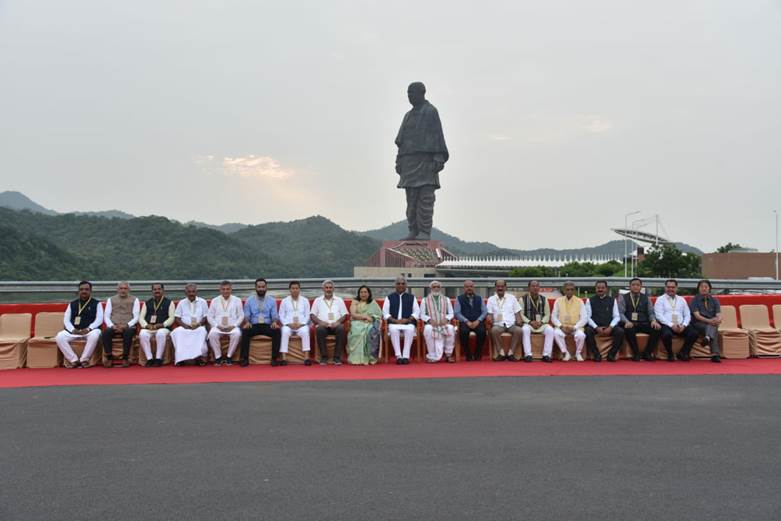
The Ministers of Environment, Forest and Climate Change from across the country participated in the conference. The conference began with welcome remarks by Shri Bhupendrabhai Patel, Chief Minister of Gujarat and remarks by Shri Bhupender Yadav, Union Minister of Environment, Forest and Climate Change. Shri Ashwini Kumar Choubey, Minister of State for Environment, Forest and Climate Change was also present among other dignitaries. State Forest and Environment Ministers, the concerned State Secretaries as well as Chairmen of State PCBs / PCCs along with PCCFs also participated in the two-day National Conference of Ministers’ of EF&CC.
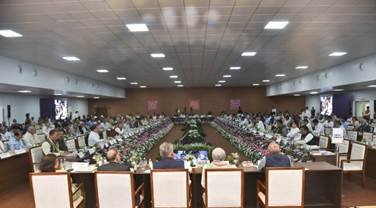
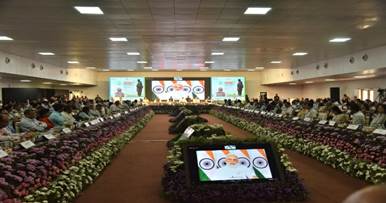
The Prime Minister in his address remarked that India is not just taking huge strides in the field of renewable energy, but also guiding other nations of the world. The Prime Minister added that India is a rapidly developing economy, and it is continuously strengthening its ecology as well.
Drawing everyone’s attention to the net zero target for the year 2070, the Prime Minister said that the focus of the country is on green growth and green jobs. He also highlighted the role of the Environment Ministries of the States in achieving these goals. The Prime Minister said, “I urge all Environment Ministers to promote a circular economy as much as possible in the states.” Shri Modi supplemented his statement by mentioning that it will significantly strengthen the Solid Waste Management campaign and will also free us from the menace of single use plastic.
Referring to the role of the environment ministries, the Prime Minister said that this role should not be seen in a regulatory role. He lamented the fact that for a long time the Environment Ministries took their role as more of a regulator. However, the Prime Minister said, “I think that the role of the Environment Ministry is more as a promoter of the environment rather than as a regulator.” He asked the states to own the initiatives like Vehicle Scrapping policy, and biofuel measures such as ethanol blending and help to strengthen them on the ground. He asked for healthy competition as well as collaboration among the states to promote these measures.
Pointing out the learning opportunities in Kevadiya, Ekta Nagar, the Prime Minister remarked on the solutions to issues like the simultaneous development of ecology and economy, strengthening of the environment and creation of new employment opportunities, bio-diversity being a medium to increase eco-tourism, and to address how the wealth of the forest grows with the wealth of our tribal brothers and sisters.
PM's address:
https://pib.gov.in/PressReleseDetailm.aspx?PRID=1861687
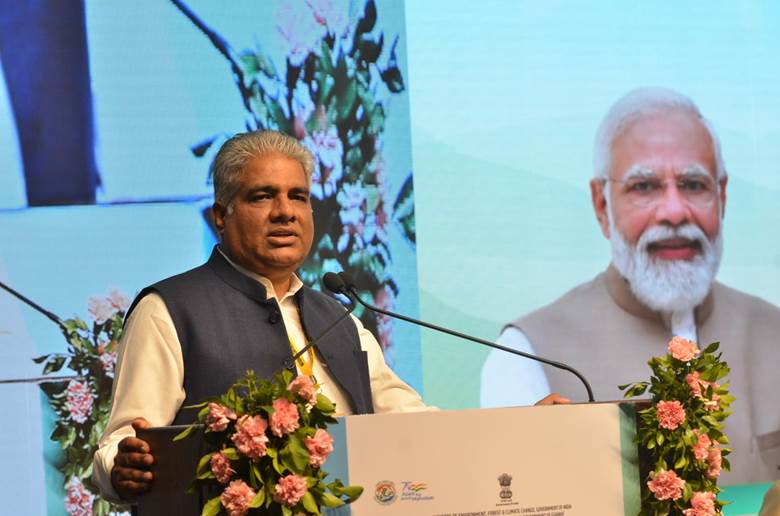
Union Minister Shri Bhupender Yadav also addressed the National Conference of Environment Ministers yesterday. He said that in front of the statue of Sardar Patel, seeing this philosophy of development along with a special craft and architecture of the country’s environmental development, all the ministers and officers are expressing the belief that it is definitely a Shreshtha Bharat”: Vision for the best India.
Shri Yadav had mentioned that Hon’ble Prime Minister gave the vision of Mission Life to the whole world in Glasgow. A discussion on the session of Mission Life was planned with Executive Officers of NITI Aayog along with National Action Plan and State Action Plan.
Shri Yadav added that the topic of plastic ban was raised in the Environment SMP of the world and India has taken adequate steps in that regard.
Shri Yadav shared that under the leadership and vision of Hon’ble Prime Minister we have taken the country towards ecological harmony by restoring the cheetahs in the country. From that point of view, the topic of wildlife, about biodiversity, as well as the topic of preserving wetlands was also discussed in the conference.
Union Minister informed that India has got the status of Ramsar site for 75 wetlands. He said that along with concern for Air pollution the topic of Agro Forestry was included in the themes for discussion at the conference.
Shri Yadav stressed that the two-day conference has been organised with the hope that we can contribute to the vision of a self-reliant India by working as a team.
The two-day Conference organised on the 23rd and 24th of September had six thematic sessions with topics focusing on LiFE, Combating Climate Change (Updating State Action Plans on Climate Change for Mitigation of Emissions and Adaptation to Climate Impacts); PARIVESH (Single Window System for Integrated Green Clearances); Forestry Management; Prevention and Control of Pollution; Wildlife Management; Plastics and Waste Management.
The first thematic session held yesterday was on PARIVESH (Pro-Active and Responsive facilitation by Interactive and Virtuous Environment Single-window Hub). PARIVESH was launched in August 2018 in order to achieve Hon’ble PM’s Vision of reducing time taken for granting clearances. Through a trend analysis since 2014, it was explained how the PARIVESH combined with several policy reforms has been able to help in reduction in time taken in grant of Environment Clearance (EC) and Forest Clearance (FC).
During the pandemic of COVID-19, the new normal prompted our society to seek more technology driven solutions to reduce physical touch points for obtaining services. A need was felt to enhance users’ experience on PARIVESH leveraging emerging technologies for faster Green Clearances and Compliances and accordingly Ministry has taken up the task of enhancing the scope of existing PARIVESH with total 16 modules and more than 140 key functionalities. Some of the key modules envisaged in PARIVESH are Configurable Admin Module, Decision Support System (DSS), Know Your Approvals (KYA), CAMPA Mgmt., Helpdesk Mgmt., Legal Repository, Auditor Mgmt., Entity Ledger, Payment Gateway. About 10000 plus regulatory stakeholders would be connected through Workflow automation of PARIVESH.
It was mentioned that envisaged PARIVESH would be a technology driven, professionally managed institutional mechanism, which will operate as a ‘’single window’’ platform for administration of all Green Clearances, and subsequent compliance management. The key drivers are process transformation, technological transformation and domain knowledge intervention.
The envisaged PARIVESH aims to have single source of truth, effectiveness through process & data synchronization, transparent & informed decision making and strengthen “Minimum Government Maximum Governance”. Currently the envisaged PARIVESH development work is in progress and is planned to be launched by the end of 2022.
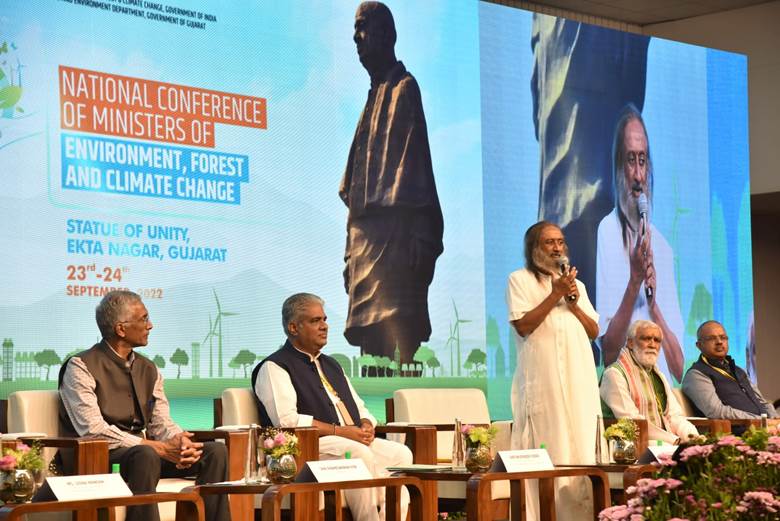
Followed by PARIVESH, a motivational session on Lifestyles for Environment was held. The session was taken by Sri Sri Ravisankar. He spoke on the theme of LiFE set by PM Modi in Glasgow and mentioned that India is being recognized for these efforts. He gave example of tribal lifestyle of Chattisgargh where he witnessed no pollution both in air and water. He felt this should be adopted in the urban lifestyle as well. The panchtatva of the environment should be preserved. He also lauded the concept of Natural farming that uses natural microbes and other species for enhancing agricultural productivity.
He brought the attention to how environment and mindset are connected. When a person is tense, he/she does not react responsibly both in social or physical environment, said Shri Sri Ravishankar and while working for the environment through activities like planting and farming, it releases mental stress. He advocated such activities both for environment and mental health. He urged all to help people in distress, a good way to do so is to reflect on achievements of past. Spread smiles and live a healthy life was what he focused on. He also steered a 20-minute meditation round to energize the gathering and for spiritual awakening.
The second thematic session held yesterday was on Combating Climate Change and on Summary of LiFE session. Shri Parameswaran Iyer, CEO, NITI Aayog, gave a presentation on Lifestyles for Environment (LiFE) movement. The presentation explained about Mission LiFE, its goals, objectives and intended impacts and how to make Mission LiFE become a Jan Andolan. CEO NITI Aayog, highlighted the role of Central and State Ministries and Departments of Environment, Forest and Climate Change in facilitating implementation of Mission LiFE. Updating the NDCs on the UNFCCC registry was an important step in the light of upcoming COP 27 at Egypt, he said.
Shri Iyer further said that we must think about the actions can be taken at the individual level or at the level of the community to save and preserve our environment. He suggested that everyday simple activities can help preserve the environment. He further stated that sustainability is the core of our culture and tradition and India is leading the world towards sustainability. He said that under the Mission LiFE and that people need to be encouraged to become pro-planet, stop being mindless and destructive and instead move towards mindful and constructive utilization of resources. Mission Life is an India-led Global Jan Andolan under which simple relatable actions across the world can be taken to protect the environment. These actions should not generate negative impact on economy and in fact should stimulate jobs and growth.
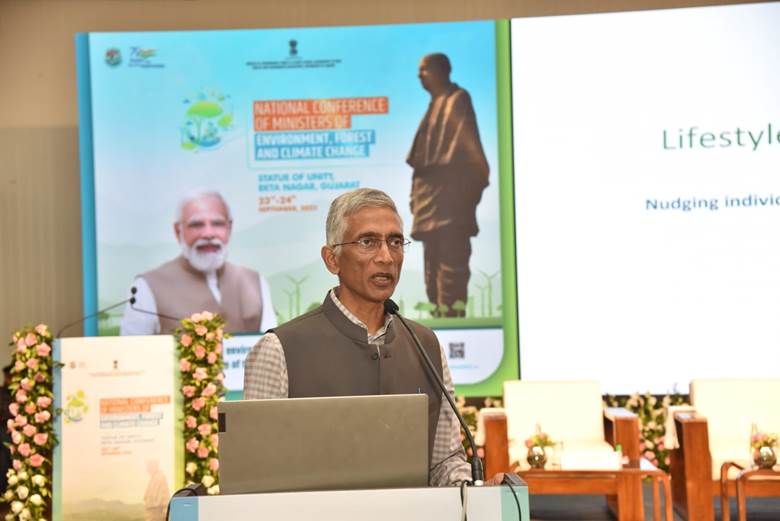
Mission LiFE will leverage existing institutions, resources and programmes of State Government and Central Government, said Shri Iyer. While making the presentation he also shared a list of Simple LiFE actions which include carrying cloth bags while shopping, keeping the water tap off while brushing, turning off electric appliances; double side printing, etc. The ambition of Mission LiFE from 2022 -28 is to mobilize 2/3rd of the India’s Population to become pro-planet and to partner with at least 80 countries to make it Global Jan-Andolan. He said that Mission LiFE will initially focus on 75 LiFE actions across 6 priority categories such as; e-waste, plastic waste, energy saving, water saving, recycling & reuse, and avoiding food wastage.
Suggesting some actions, he urged the participants at the Conference to use Stairs, when possible, print minimally and use air conditioners sparingly. He also requested the Ministers to promote LiFE in the constituency through events, campaigns and training through other forums, trigger citizens to become pro-planet through online and offline communications including social media.
While concluding, Shri Iyer CEO Niti Aayog, stated that Global Jan Andolan will be lead by people of India where individuals will upload videos of their daily life actions on MyGov portal. The vision of LiFE needs to become a replicable Global Model of sustainability for the World.
“Updating State Action Plans on Climate Change (SAPCC) for Mitigation of Emissions and Adaptation to Climate Impacts” were also discussed during the Conference.
India’s National Action Plan for Climate Change (NAPCC) provides the overarching policy framework for climate change mitigation and adaptation through its National Missions and represent multipronged, long term and integrated strategies for achieving key goals in the context of climate change. State Governments were also encouraged to develop their Action Plans in line with the NAPCC. These action plans are known as State Action Plan on Climate Change (SAPCC).
Following the announcement of Panchamrit at COP 26 and call for one word movement on LiFE, ‘Lifestyle for Environment’ given by Hon’ble Prime Minister of India, India has updated its National Determined contributions for 2021-2030 in August 2022. In line with the Nationally Action Plan on Climate Change, (NAPCC), all the SAPCC are now being revised to align with the latest scientific insights, as well as with India’s NDCs under the Paris Agreement. Citing the GHG emission profile of India. It was further highlighted that major emission is through energy sector, others being industry, agriculture and waste sectors, which need focus while designing the SAPCC.
The revised SAPCC is a policy document of the State to reflect the strategies and policies with focus on climate change mitigation and adaptation in key sectors in the States and UTs. The SAPCC is expected to be based on scientific research and reports on the vulnerability of key ecosystems, and projected impacts of climate change.
States/UTs are incorporating several mitigation and adaptation measures, such as use of efficient and cleaner technologies, renewable energy, E-mobility, waste management, climate resilient infrastructure, afforestation, sustainable urbanization, and water conservation in their SAPCC documents. The SAPCC should be based on a sound scientific understanding of climate risks and vulnerabilities. Further, the SAPCC need to reflect the highest possible ambition of the State/UT to combat climate change through appropriate measures and policies. SAPCC’s will play an important role in mainstreaming climate concerns in the broader development process and help in achievement of India’s NDCs under the Paris Agreement. SAPCC should lay out sector-specific and cross-sectoral, time bound priority actions for the state, outlay budgetary requirements, and outline necessary institutional and policy infrastructure including planning processes.
The third thematic session held was on Plastics and Waste Management. The session commenced with a presentation on Plastics and Waste Management. The Plastic Waste Management Rules 2016, which provide the regulatory framework of management of plastic waste in the country was highlighted. Hon’ble Prime Minister’s vision to make India Single-use Plastic free and moving towards mission circular economy was highlighted.
It was also highlighted that the regulatory framework for management of wastes in the country has been comprehensively revised in 2016 following the principles of circular economy. The capacity for processing of wastes viz. solid waste, hazardous waste, bio-medical waste, E-waste, plastic waste, construction and demolition waste has increased significantly in the last 8 years. The strategy adopted by the Government to tackle unmanaged and littered plastic waste has two pillars (i) ban on single use plastic items which have high littering potential and low utility, and (ii) Implementation extended producer responsibility on plastic packaging.
Implementation of EPR on plastic packaging will lead to (i) reduction littered and unmanaged plastic waste in the country, (ii) promote circular economy of plastic packaging waste, (iii) Promote development of new alternatives to plastics and development of new business models, and (iv) Move towards sustainable plastic packaging. The EPR framework is implemented through a centralized online portal ensuring ease of doing business.
The Rules mandating Extended Producer Responsibility in different waste streams viz. E-waste, waste tyres, waste batteries have been notified to operationalize circular economy principles. Circular Economy approaches not only have environmental benefits but also lead to resource conservation and reduced dependence on virgin materials.
The States and UTs informed about the implementation of SUP ban and enforcement activities being undertaken. The States and UTs shared their best practices for moving away from banned SUP items such as setting up of Bartan Bhandars with help of women self-help groups in villages. The importance of people participation in the success of the ban was highlighted. Some of the States also mentioned about the need for getting central assistance for setting up of recycling infrastructure. The issue of plastic waste management problem in villages was also discussed.
A thematic session on Wildlife Management including Bio-Diversity and Conservation of Wetlands Biodiversity was held today on the second day of the Conference.
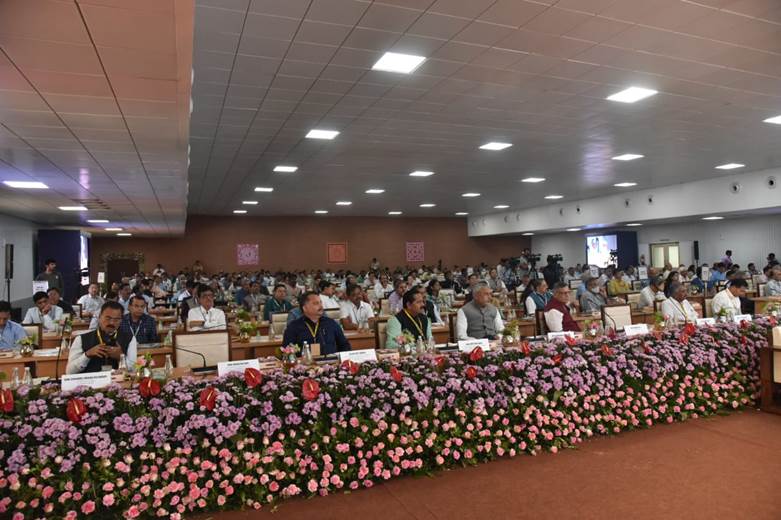
India’s abundant biodiversity richness is evident in its biodiversity hotspots, biogeographic zones, 16 forest types, 54733 floral and 103258 faunal species was highlighted during the session. It was mentioned that necessary legislation and institutional framework viz., Biological Diversity Act, 2002, National Biodiversity Authority (NBA), State Biodiversity Boards (SBBs), Union Territory Biodiversity Councils (UTBCs) and Biodiversity Management Committees (BMCs) have been constituted in light of this rich biodiversity. At present, there are 28 SBBs, 8 UTBCs, 2,76,895 BMCs and 2,67,345 People’s Biodiversity Registers (PBRs). It was emphasized that involvement of communities in biodiversity conservation will serve the twin purpose of generating livelihood and conservation of biodiversity in a holistic manner.
Given the biodiversity richness of India and the urgent need to address conservation measures, it was mentioned that the states may take a proactive approach by supporting measure to strengthen SBBs and UTBCs, complete PBRs and support the transition to e-PBRs.. Also, considering that only 14 States have declared Biodiversity Heritage Sites (BHS), the remaining 22 states may take necessary steps to declare more such sites. States were also urged to assist in identifying other conservation measures such as potential Other Effective- Area Based Conservation Measures (OECM) sites.
For the conservation and management of wetlands in the country, MoEF&CC undertook a four-point approach comprising of regulatory frame work, capacity building and outreach, implementation of National Plan for Conservation of Aquatic ecosystems (NPCA) and subsequent alignment with the Ramsar Convention. The number of wetlands designated as Ramsar sites in India increased from 26 in 2013 to 75 in the year 2022.
MoEF&CC notified the Wetlands (Conservation and Management) Rules, 2017, superseding the Rules of 2010. This included constitution of a National Wetlands Authority Wetland Authorities were constituted in all states/UTs. To facilitate the State/UTs to implement the rules, Guidelines were also released.
The implementation of NPCA employs a four pronged approach that includes preparation of brief document of the wetland, having a dedicated stream of volunteers as Wetland Mitras, preparing the health cards of the wetland and developing an integrated management Plan. Guidelines were released in March 2020 which aims at holistic conservation and restoration of wetlands. This scheme is implemented on cost sharing basis between Central Government and respective State Governments. Under the NPCA, till 31st March 2022 financial assistance has been provided to 164 wetlands across the country.
To address the key issues and concerns pertaining to the wetlands, it is necessary to develop comprehensive and long term planning based on site specific needs. Comprehensive management plans need to be introduced through a management approach. The policy shifts in 2020 towards formulating Integrated Management Plans (IMPs) has resulted in IMPs for over 60 wetlands. Further, IMPs for all Ramsar sites and significant wetlands is envisioned. The recent recommendations of SAHBHAGITA workshop for inclusive conservation management is also implemented.
Apart from this there were parallel sessions on Prevention and Control of Pollution (with a focus on National Clean Air Programme) and meeting with Heads of MoEFCC Institutions.
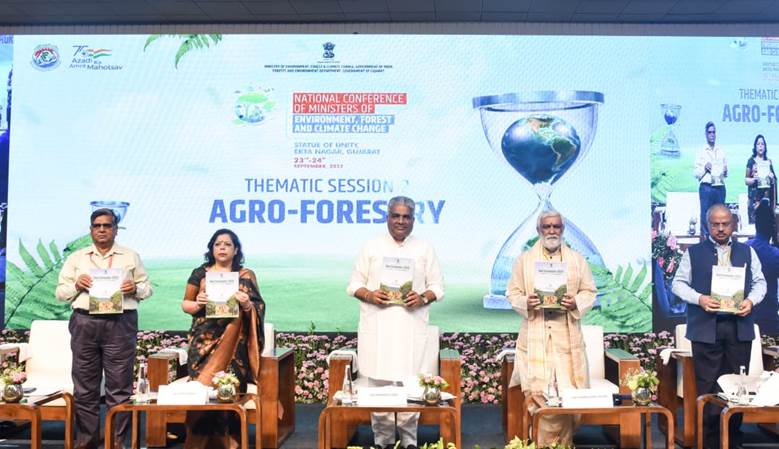
The second thematic session on second day was on Agro-forestry. Agro-forestry, farm forestry and trees outside forests in general contribute to the increase in tree cover and enhance landscapes and ecosystem services, while meeting a bulk of the country's wood demand and providing climate resilient incomes to farmers. Agroforestry and commercial tree plantations outside forest lands have tremendous opportunities to enhance incomes of farmers and generate employment. Promotion of wood use, obtained from sustainably managed woodlots, will play a significant role in conserving natural forests and tree cover and reduce the burden on timber imports. Agroforestry is beneficial for farmers in multiple ways as it not only enriches the soil but also it helps farmers for providing an alternative source of income.
The Ministry plans to undertake a paradigm shift in the approach to agroforestry, in order to bring about multiple environmental, economic, and social benefits and achieve the national goal of bringing one third of the area under forests and tree cover. MoEFCC has constituted a Task Force and Joint Working Groups for promotion and expansion of agroforestry. The reports of these committee have suggested measures like the accreditation of nurseries for quality planting material, adoption of pan India transit permit system, to exempt more tree species, further relaxing guidelines for setting up of wood-based industries to enable small processing centres in taluka levels, development of indigenous system of certification of wood, quality control of timber and its products, through national certification agency like BIS for domestic market, provision for credit and finance to tree growers, setting up of a National Wood Council at the Centre, etc. MoEF&CC has also brought out the Accredited Compensatory Afforestation Mechanism under the provisions of Forest (Conservation) Rules, 2022 to encourage individuals to raise vegetation on their land and sell it to persons who need to meet compensatory afforestation targets. This is expected to act as an incentive to farmers and tree growers to develop plantations and undertake agro-forestry. MoEFCC has also requested to all states to adopt National Transit Pass System (NTPS) for inter-state and intra-state movement of timber and forest produce with an aim to one nation-one pass. It was emphasized to make necessary amendments in State Transit Rules/Acts to remove requirement of in-lieu TP and for adopting NTPS.
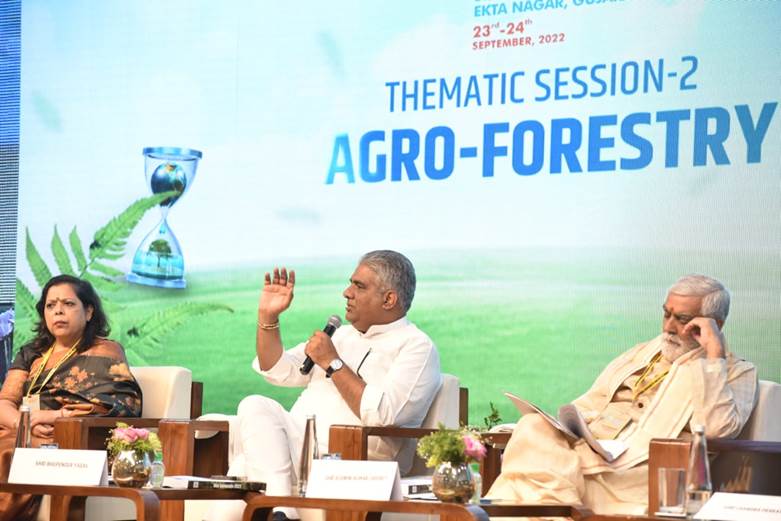
Ministers of Environment, Forest and Climate change as well as Secretaries and Principal Chief Conservator of Forests from various states and UTs shared their views and suggestions regarding the approaches that need to be adopted for the promotion of agroforestry on a mission mode. Detailed discussions were made on the relaxations that need to be brought out in the existing regulations on felling and transit of wood originating outside forests, availability of quality planting materials, develop traceability and certification of wood products, quality standardization and promotion of wood-based industries and value chains.
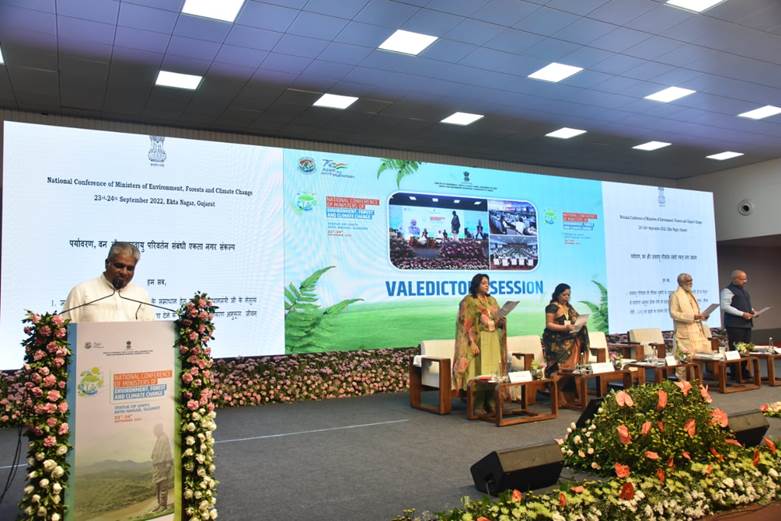
Speaking at the valedictory session, the Minister for Environment, Forest and Climate Change, Shri Bhupender Yadav said that an individual is like a drop in the ocean and the team is like an ocean itself which has huge power and force. It is the spirit of Team India which will take us forward, he added. The Union Minister also said that Ministry of Environment is not only committed to protection of the environment but is also an equal partner in development of the country and needs to add to our GDP through Eco tourism and Agro Forestry. Three pledges were taken at the concluding session of the two days Conference at Ekta Nagar, Gujarat:
- In order to tackle the global challenge of the climate change, under the able leadership of the Prime Minister, we take a pledge to promote the environment friendly lifestyle LiFE.
- We take a pledge to enhance the Forest life, forest protection and green zones.
- To make our country self-reliant We take a pledge to preserve wood and related products, to identify the opportunities for agri-commerce, to enable the policy framework related to scientific infrastructure and to increase the employment and income opportunities of the farmers, tribal groups and local communities.
The valedictory session was also addressed by Shri Ashwini Kumar Choubey, MoS, MoEF&CC, Smt Leena Nandan, Secretary MoEF&CC and Shri C P Goyal, DG Forest. In the end, the Union Minister conveyed heartfelt thanks to the Ministers of Gujarat along with the Secretaries and other Officers who participated in the conference.
***
PM/HS/IG
(Release ID: 1861958)
Visitor Counter : 3003